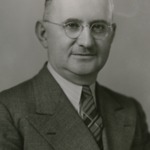Interviewer: Lillian Van Loan
Interview Date: circa 1956
Location: Oregon State College, Corvallis, Oregon
Duration: 0:17:57
In this interview, Charles V. Ruzek discusses his experiences at Oregon Agricultural College and later. In 1914 Ruzek joined the faculty of the Agronomy department, and engaged in teaching and Experiment Station duties related to soil science. In reflecting on this time, he reminisces about his initial impressions of the campus, discussing how different it was from the previous colleges where he had worked.
Next, Ruzek discusses the growth of the soil department and some pioneering soil survey work initiated in 1916. He describes challenges faced in convincing authorities to introduce cars for survey work, highlighting the shift from horse and buggy. Ruzek's narrative also spans various personal and professional milestones, including advanced studies at his alma mater, Wisconsin, and his role as chairman of the Board of Control, where he oversaw both intercollegiate athletics and educational activities.
From there, the interview delves into Ruzek's involvement in the athletic program, particularly during the 1941 championship year when the Oregon State College football won the Pacific Coast Conference and played in the Rose Bowl. Despite the challenges posed by the attack on Pearl Harbor, the game found a new location in Durham, North Carolina, resulting in a triumphant victory for Oregon State. Ruzek mentions notable players and the success of the team during his tenure as chairman of the athletic department.
Reflecting on the growth of the soil department and his interactions with various deans, Ruzek expresses pride in the development of the soil survey work and its positive impact on Oregon counties. The interview concludes with Ruzek describing the pride he feels in being associated with Oregon State College.
Dublin Core
Title
Description
Next, Ruzek discusses the growth of the soil department and some pioneering soil survey work initiated in 1916. He describes challenges faced in convincing authorities to introduce cars for survey work, highlighting the shift from horse and buggy. Ruzek's narrative also spans various personal and professional milestones, including advanced studies at his alma mater, Wisconsin, and his role as chairman of the Board of Control, where he oversaw both intercollegiate athletics and educational activities.
From there, the interview delves into Ruzek's involvement in the athletic program, particularly during the 1941 championship year when the Oregon State College football won the Pacific Coast Conference and played in the Rose Bowl. Despite the challenges posed by the attack on Pearl Harbor, the game found a new location in Durham, North Carolina, resulting in a triumphant victory for Oregon State. Ruzek mentions notable players and the success of the team during his tenure as chairman of the athletic department.
Reflecting on the growth of the soil department and his interactions with various deans, Ruzek expresses pride in the development of the soil survey work and its positive impact on Oregon counties. The interview concludes with Ruzek describing the pride he feels in being associated with Oregon State College.

